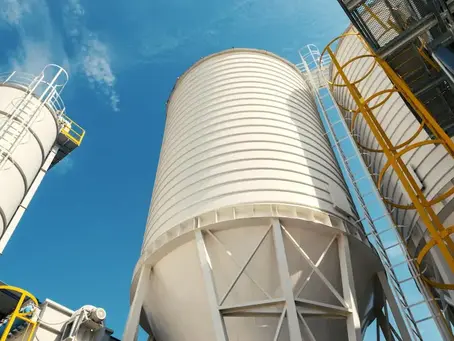top of page
How to calculate Volume of air (CFM) Of
Air Compressor
All Posts


7 Signs Your Rotary Screw Compressor Needs Maintenance
Proper maintenance of your rotary screw compressor is crucial for ensuring optimal performance and longevity. Regular checks can save you...
Ahmed Hessien
Jan 1, 20253 min read


Why Choose a Screw Air Compressor for Your Business?
Screw air compressors have become increasingly popular in various industries, but what makes them stand out? In this blog, we'll explore...
Ahmed Hessien
Jan 1, 20253 min read


Are Screw Air Compressors Suitable for Home Use?
Screw air compressors are gaining popularity among DIY enthusiasts and homeowners alike. But are they the right choice for your home?...
Ahmed Hessien
Dec 25, 20243 min read


8 Industries Revolutionized by the Use of an Air Compressor in Mumbai
In the bustling city of Mumbai, innovation never takes a back seat. Among the many tools that facilitate groundbreaking advancements, the...
Ahmed Hessien
Dec 25, 20244 min read


How Does a Rotary Screw Compressor Compare to Other Types?
In the world of compressors, it's vital to understand the differences between various types to make an informed decision for your needs....
Ahmed Hessien
Dec 18, 20243 min read


8 Common Issues with Rotary Screw Compressors and How to Fix Them
Rotary screw compressors are essential tools in many industries, offering reliable performance and efficiency. However, like any machine,...
Ahmed Hessien
Dec 18, 20244 min read


Maintenance Tips for Keeping Your Air Compressor Efficient
Air compressors are essential tools that help power a variety of projects, from DIY home improvements to professional-grade jobs....
Ahmed Hessien
Dec 11, 20245 min read


12 Ways an Oil-Free Compressor Can Enhance Home Improvement Projects in Vasai
Home improvement projects can sometimes become overwhelming, especially when it comes to choosing the right tools. One game-changer that...
Ahmed Hessien
Dec 11, 20243 min read


Can a Top Air Compressor Be Used for Both Commercial and Small-Scale Projects?
Air compressors are versatile machines that come in various sizes and specifications. But can a top air compressor effectively serve both...
Ahmed Hessien
Dec 5, 20243 min read


How Does a Screw Air Compressor Work?
A screw air compressor is a vital component in many industrial applications, providing a reliable source of compressed air. Understanding...
Ahmed Hessien
Nov 28, 20244 min read


How Do I Choose the Top Air Compressor for My Needs?
Choosing the right air compressor can be a daunting task with so many options available. This guide will break down the key factors to...
Ahmed Hessien
Nov 21, 20243 min read


Maintenance Tips for Extending the Life of Your Screw Air Compressor
Maintaining your screw air compressor is crucial to ensure its longevity and efficient operation. With the right care and attention, you...
Ahmed Hessien
Nov 13, 20245 min read


The Impact of Location on Choosing a Top Air Compressor
Choosing the right air compressor can significantly affect your performance and efficiency, especially depending on where you operate....
Ahmed Hessien
Nov 13, 20244 min read


10 Reasons to Consider a Rotary Screw Compressor for Your Mumbai Business
In today's competitive landscape, choosing the right equipment can significantly impact your business's efficiency and...
Ahmed Hessien
Nov 6, 20245 min read


10 Ways an Air Compressor Can Increase Your Workshop Efficiency
In today's fast-paced world, efficiency is key, especially in a workshop environment where every minute counts. One tool that can...
Ahmed Hessien
Oct 30, 20246 min read


How Do I Maintain My Oil-Free Compressor?
Maintaining an oil-free compressor is essential for ensuring its longevity and efficient operation. In this guide, we'll explore simple...
Ahmed Hessien
Oct 23, 20243 min read


Why Choose an Oil-Free Compressor Over Traditional Models?
Oil-free compressors are gaining popularity as reliable alternatives to traditional models. Understanding their benefits can help you...
Wing Chan
Oct 16, 20243 min read


How to Maximize Efficiency with Your Air Compressor
Air compressors are invaluable tools in many industries and homes, but maximizing their efficiency is key to getting the most out of your...
Wing Chan
Oct 9, 20244 min read


Exploring the Benefits of Oil-Free Air Compressors
Oil-free air compressors are gaining popularity in various industries due to their efficiency and eco-friendliness. In this blog, we will...
Wing Chan
Oct 2, 20245 min read


Oil-Free Compressors: A Game-Changer for Automotive Workshops
In the bustling world of automotive workshops, efficiency and reliability are key to success. One of the most significant advancements in...
Wing Chan
Sep 25, 20244 min read
bottom of page
